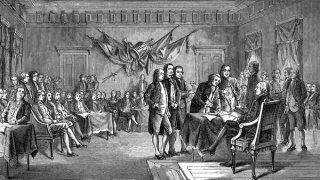Tomorrow, we remember the Declaration of Independence for its aspirational language and calls for freedom and equality. These claims have made the Declaration a timeless document—one that forever holds a mirror to America’s experiment in self-government, sets a standard against which the country should judge its actions, and serves as a worldwide rallying cry to those struggling for their own liberty against authoritarian regimes.
Widespread veneration of the Declaration’s preamble however, has obscured the specific grievances that made it resonate with the Americans of 1776. These grievances came in the form of 27 specific charges against King George III of England and were intended to serve as an overwhelming indictment of his actions and an irrefutable argument on behalf of independence.
The Declaration of Independence was not a particularly original text. In fact, there had been nearly 100 local versions drafted by colonial legislatures, counties, and towns which pre-dated the July 4 Declaration. But Thomas Jefferson’s ambitions for a national declaration of independence were considerably more ambitious. Not only would this be a statement of political philosophy, it would also make the case that the British crown had acted as an authoritarian power; that the acts committed were antithetical to American notions of liberty, and that, as such, the states were compelled towards separation.
To prove the gravity of the offenses, the grievances were primarily clustered around five principal charges: abuse of power, obstruction of justice, promulgation of corruption, undue intrusion of the military into civil affairs, and incitement of violence. As much as these critiques were relevant and timely in 1776, they are worth revisiting today, because they continue to resonate to a country that, nearly 250 years later, still finds itself confronted by authoritarian powers abroad and illiberal tendencies at home.
Widespread veneration of the Declaration’s preamble however, has obscured the specific grievances that made it resonate with the Americans of 1776.
The first charge, abuse of power, focuses on the sovereign’s subordination of the law to his personal interests and the unchecked growth of his powers. The grievances accused the British monarch of vetoing legislation “necessary for the public good,” refusing to enforce laws that were on the books but with which he personally disagreed, and taking actions that replaced deliberative self-government with arbitrary impulse and fiat. The King was also charged with dissolving legislative bodies that took up ideas that were antithetical to the crown’s interests. Blame, however, was not just on the King. While the Declaration placed most of the fault on the monarch, the Americans also found that the King had “combined with others to subject us,” accusing the British parliament of becoming willing collaborators, who had sanctioned these assaults on their basic liberties.
The Declaration also charged that the King had “obstructed the Administration of Justice,” and designated his actions illiberal in both intent and practice. He had failed to respect an independent judiciary and sought to make judicial appointments loyal to, and dependent upon, the King’s good graces and not fealty to the law. They accused him of seeking to circumvent the basics of due process, and conjuring up “pretended offenses” to persecute political opponents. The Declaration also charged the King with increasing corruption in the colonies, by creating a whole new category of officeholders “to harass our people and eat out their substance.” Indicting the British system with such a list was intended to whip up American passions about the travesty of justice being visited on their shores; it was also meant to mark such actions as antithetical to the American experiment.
The same held true with regards to the intrusion of the military into civilian affairs. In the view of those Americans gathered in Philadelphia, one of the prime distinctions drawn between the new world and the old was their antipathy towards autocratic governments served by their armed forces. The Declaration accused the King of keeping “among us, in times of peace, Standing Armies without the Consent of our legislatures,” rendering “the Military independent of and superior to the Civil Power, and quartering “large bodies of armed troops among us.” The King had collapsed the distinction between peacetime and war, and militarized disagreement by suppressing acts of political protest.
On the nation’s birthday, and at a critical moment in our nation’s history, reading the long list of grievances in the Declaration reminds us that opposition to tyranny abroad and at home is the foundation of our independence.
Worse still, from the viewpoint of many of the Declaration’s signers, was that the King had used the awesome powers he commanded to stir up civil unrest and incite violence. This charge referred explicitly to British efforts to get Native Americans to attack the rebelling colonists and implicitly to the proclamation by the Virginia Royal Governor promising freedom to the state’s slaves if they turned against their masters. Given that these accusations directly implicated the sovereign in attempts to attack his own citizens, they might well have been the most explosive charge.
They were also, of course, the most ironic, given that the Declaration is a sustained argument for equality, dignity, and liberty—made by men, many of whom owned slaves, and several of whom were ardent defenders of the institution. The rank hypocrisy of declaring themselves free from the tyranny of King George III while holding thousands of black men, women, and children in bondage, was not lost on contemporaries. In his defense of the British actions, the distinguished British essayist Samuel Johnson had asked “how is it that we hear the loudest yelps for liberty among the drivers of negroes?”
The Declaration’s long list of particulars concludes with the assertion that “a prince, whose character is thus marked by every act which may define a tyrant, is unfit to be the ruler of a free people.” The founding generation believed that tyranny was a danger that could be imposed from overseas. They also feared that it could develop at home and that is precisely why the Declaration catalogued the ways in which liberty could be undermined.
Some 50 years after the country’s founding, in perhaps the most famous Fourth of July speech in the nation’s history, John Quincy Adams would argue that “the successful resistance of a people against oppression, the downfall of the tyrant and tyranny itself,” was the central message of the Declaration of Independence and the ultimate mission of the American republic.
On the nation’s birthday, and at a critical moment in our nation’s history, reading the long list of grievances in the Declaration reminds us that opposition to tyranny abroad and at home is the foundation of our independence.






